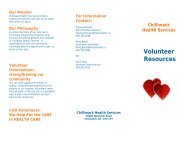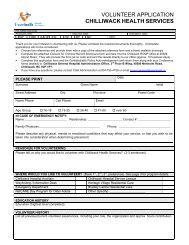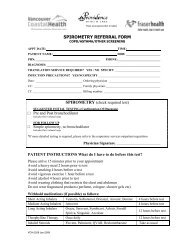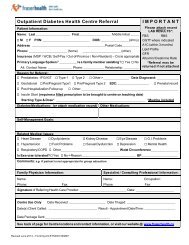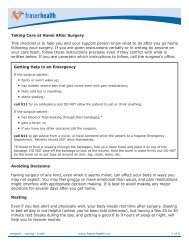About the health care team - Fraser Health Authority
About the health care team - Fraser Health Authority
About the health care team - Fraser Health Authority
- No tags were found...
Create successful ePaper yourself
Turn your PDF publications into a flip-book with our unique Google optimized e-Paper software.
Intensive Care – Getting to Know Your<strong>Health</strong> Care TeamMembers of <strong>the</strong> <strong>health</strong> <strong>care</strong> <strong>team</strong> may differ from unit to unit and <strong>the</strong>ir roles may be unfamiliar to you. Abrief description of <strong>the</strong>se roles is given below. If you wish more information, feel free to ask <strong>the</strong> staffmember more about <strong>the</strong>ir role.Unit ClerksThese are usually <strong>the</strong> first people you will meet on admission. They will assist you when you wish to visitor communicate with any of <strong>the</strong> <strong>health</strong> <strong>care</strong> <strong>team</strong>. They also provide clerical duties for <strong>the</strong> unit.PhysiciansMost critical <strong>care</strong> or intensive <strong>care</strong> units are what we call “closed units” meaning that once within <strong>the</strong> unit,<strong>care</strong> is determined by <strong>the</strong> core group of physicians that staff <strong>the</strong> unit. These physicians may berespirologists, cardiologists, internists or intensivists depending on <strong>the</strong> type of unit. All have specialtytraining to manage <strong>the</strong> overall <strong>care</strong> of <strong>the</strong> critically ill patients.Critical Care NursesNurses with specialty training in critical <strong>care</strong>provide most of <strong>the</strong> direct hands-on <strong>care</strong> for <strong>the</strong>patient. The scope of this <strong>care</strong> ranges fromproviding for basic needs to managing <strong>the</strong> highlyspecialized drugs and equipment that may benecessary to support <strong>the</strong> heart and lungs.Depending on <strong>the</strong> unit, some <strong>care</strong> may also begiven by a licensed practical nurse (LPN) or anurse aide (NA).Respiratory Therapists (RTs)Respiratory Therapists are specialists inmanaging all <strong>the</strong>rapies related to breathing.Care provided by RTs includes breathingtreatments and tests, management of artificialairways and artificial ventilation (breathingmachines).
Physio<strong>the</strong>rapistsPhysio<strong>the</strong>rapists assist patients as necessary to cough, turn and mobilize (get up). Maintainingstrength and conditioning is an important factor in getting better and transferring out of <strong>the</strong> critical<strong>care</strong> unit and physio<strong>the</strong>rapists are here to help you do that.PharmacistsThe clinical pharmacist ensures that important chronic medications are continued. He or she willwork with <strong>the</strong> <strong>team</strong> to make sure that your loved one receives <strong>the</strong> best possible medications for<strong>the</strong>ir illness, including optimizing <strong>the</strong> types and doses given, as well as monitoring for effectiveness,important interactions, and side effects.Social WorkerA social worker can help in setting up meetings with <strong>the</strong> physicians, clarifying information orproviding any needed supports for <strong>the</strong> family. Social work can also assist with any legal or financialmatters that may occur as a result of hospitalization. Please feel free to request to talk to <strong>the</strong> socialworker.DietitiansPatients in <strong>the</strong> ICU have higher than normal (and different) nutritional needs. Dietitians calculate<strong>the</strong> individual needs for <strong>the</strong> patient and monitor <strong>the</strong>ir nutritional intake to ensure it is adequategiven <strong>the</strong>ir changing needs.AidesAides may be used to stock and clean equipment, assist with transporting patients and o<strong>the</strong>rsupportive tasks.HousekeepingHousekeepers have specialty training to provide cleaning within hospitals (measures to preventspread of infection) and for management of isolation rooms.StudentsIf at a teaching hospital, <strong>care</strong> may also be given by residents, medical students or students of any<strong>health</strong> <strong>care</strong> profession under <strong>the</strong> supervision of our staff.




